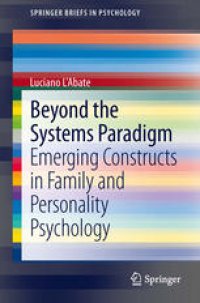
Ebook: Beyond the Systems Paradigm: Emerging Constructs in Family and Personality Psychology
Author: Luciano L'Abate (auth.)
- Tags: Personality and Social Psychology, Developmental Psychology, Psychology Research
- Series: SpringerBriefs in Psychology
- Year: 2013
- Publisher: Springer-Verlag New York
- Edition: 1
- Language: English
- pdf
This monograph owes its origins to the decades-old proposal by David Bakan (1968) about the duality of human experience. He proposed that community and agency would be two necessary and sufficient constructs to classify and to encompass most human relationships. This dichotomy has been found to be valid by a variety of contributions over the last half a century (L’Abate, 2009; L’Abate, Cusinato, Maino, Colesso, & Scilletta, 2010). Additionally, the purpose of this book is to argue and assert that two important fields of psychology, family and personality psychologies, if not already dead are conceptually, empirically, and practically moribund. They are being superseded respectively by perhaps more appropriate, perhaps more specific, and more likely verifiable concepts and constructs, such as intimacy and identity. The traditional family still conceived as composed by two parents and two children of different gender is esponsible for only one fourth of all domiciles in USA. Singles, same-sex couples, and completely different family organization complete the remaining 100%. Difficulties in defining what is personality require a change in perspective and advance toward a comprehensive theory of human relationships that can and should fulfill requirements necessary to achieve an undoubtedly grandiose and ambitious universal status.
Mother, father, children together in a household. The number of U.S. families fitting that profile is declining steadily. And yet this arrangement is still the basis of so much of family systems theory and therapy--while the disconnect between theory and therapy is widening.
In response, Beyond the Systems Paradigm argues for the critical place of the individual in family psychology, and for the ties between family and personality psychologies as a key to modernizing systems theory and practice. The latest offering from Luciano L'Abate builds on his earlier work by analyzing the intricate relationships between conceptual ideas and clinical reality, and how this knowledge can translate into more robust theory, useful research, and effective assessment and therapy with families. The author adds new constructs of identity and intimacy to refine his Relational Competence Theory, and his new models update--and find common ground between--traditional family and personality constructs. A perspective-building tool for organizing how one understands theory and does therapy, this timely volume:
- Clarifies the links between paradigms, theories, constructs, models, and dimensions.
- Details the shortcomings of family and personality psychologies in not informing one another.
- Critically reviews the evolution of family systems and personality theory.
- Analyzes the central role of constructs in theory building and clinical process.
- Contributes new ideas to the classification of human relationships.
- Situates identity as an overarching construct in Relational Competence Theory.
For family therapists and clinicians as well as personality theorists, Beyond the Systems Paradigm provides the structure to make theory relevant, and the flexibility to make it practical.